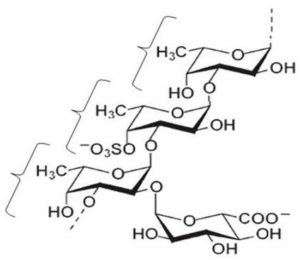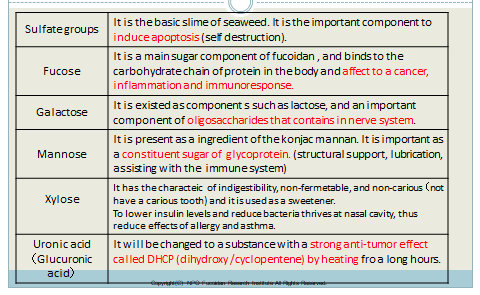Since Fucoidan may be a term that you’re not very well familiar with, I’d like to take this opportunity to let you know what the wonderful benefits that it provides are. Let’s first start by looking at “what exactly is fucoidan”. Fucoidan is extracted from brown seaweed that has a variety of different pharmacological benefits. The first fucoidan was discovered in 1913 by Professor Kylin of Uppsala University in Sweden, and this substance was first named “fucoijin” but this later changed to “fucoidan” based on the international naming convention for sugar.
Fucoidan is a natural polysaccharide of various species of brown seaweed such as mozuku, kombu, limumoui, wakame, and bladderwrack. Fucoidan is isolated from many different brown seaweeds and each has a slightly different structure. Fucoidan is a natural polysaccharide of various species of brown seaweed such as mozuku, kombu, limumoui, wakame, and bladderwrack. Fucoidan is isolated from many different brown seaweeds and each has a slightly different structure.
Fucoidan is isolated from many different brown seaweeds and each has a slightly different structure.
Example of differences between Mozuku and Kombu:

Structural study of fucoidan from Cladosiphon okamuranus Tokida


Structure of laminaran (Kadam et al., 2015), redrawn by ChemBioDraw
Fucoidan is a specific source of sliminess only found in brown seaweed and a type of water-soluble dietary fiber. Fucoidan is a macromolecular polysaccharide in which one of the main constitutes is sulfated fucose. The saccharide chain constitutes of fucoidan including fucose, galactose, manose, xylose, and uronic acid.
Function:

components and effects of sulfated polysaccharides by NPO Fucoidan Research Center
Each component of sulfated polysaccharides works mutually to gain the desired fucoidan effects.
According to a research conducted in NPO fucoidan research center, fucoidan has effects of anti-tumor, antioxidant and anti-inflammation, neuroprotective.
Moreover, fucoidan can also play a big role in fighting against cancer by inducing apoptosis, inhibition of angiogenesis and boosting immunity.
I hope that this gives you a very clear picture of what fucoidan is and the various benefits that it can provide.
